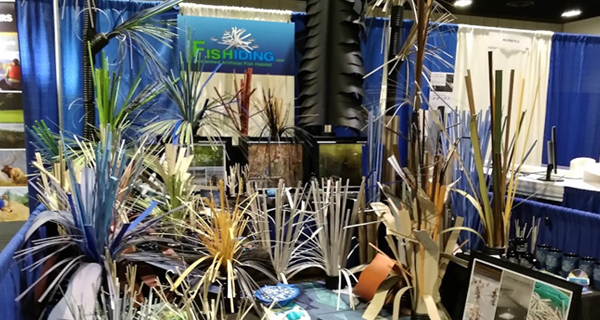Fish forced into the ‘foraging arena’ when lakes lose their trees
Posted by David Ewald on 18th Feb 2014
As water levels drop and submerged trees rise above the waterline, some fish are forced into the "foraging arena" to face predators
In attempts to predict what climate change will mean for life in lakes, scientists have mainly focused on two things: the temperature of the water and the amount of oxygen dissolved in it.
Jereme Gaeta
But a new study from University of Wisconsin-Madison researchers is speaking for the trees — specifically, the dead ones that have toppled into a lake's near shore waters.
For fish in northern Wisconsin lakes, at least, these trees can be the difference between pastures of plenty and the Hunger Games.
Under "normal" water-level situations, says Jereme Gaeta, a post-doctoral researcher at the UW-Madison's Center for Limnology and lead author of the study, trees in the water provide "coarse woody habitat." Not only do they offer a refuge for fishes that would otherwise be lunch, they also provide food for those fishes — serving as structure for algae to grow on and aquatic insects to live.
When water levels drop, that habitat is left high and dry. Without it, Gaeta says, species like the yellow perch he studied are forced to move into what's called the foraging arena, where the odds are most assuredly not in the fishes' favor.
"When lake level goes down," Gaeta says, "they lose all that refuge, so they're pretty much forced to live in the foraging arena, where they're directly interacting with their predators — in our case largemouth bass." Previous studies, he says, have found that, in the arena, vulnerability goes "through the roof."
Working with Center for Limnology director, Steve Carpenter, and Wisconsin Department of Natural Resources research scientist, Greg Sass, Gaeta and his colleagues monitored Little Rock Lake in northern Wisconsin from 2001 to 2009. During that time, a prolonged drought greatly reduced lake levels throughout the region.
In Little Rock Lake, water levels fell by just more than one meter, leaving more than 75 percent of the coarse woody habitat out of reach for fishes. During this timeframe, the researchers also documented a decline in the perch population, with the species eventually reaching undetectable levels in the lake. Similarly, the bass population began to founder, with their growth rates slowing dramatically.
Their report was published online today, Wednesday Jan. 15, in the Canadian Journal of Fisheries and Aquatic Sciences. What they think happened, Gaeta says, is that the bass binged on perch, eating themselves out of their "best prey source."
"Imagine you're growing a garden and you want a carrot. You don't pull all of them out of the ground as soon as they're ready," Gaeta says. "You leave some behind so that you can have food throughout the growing season. It's kind of like that. Under normal conditions, bass are slowly taking out prey fish, but there are still a lot left and they're just growing bigger and bigger and providing more energy."
“When lake level goes down, they lose all that refuge, so they're pretty much forced to live in the foraging arena, where they're directly interacting with their predators — in our case largemouth bass.”
Jereme Gaeta
In the foraging arena, however, the rules of the game changed for both predator and prey. Perch lost the cover crucial to both their survival and the survival of their offspring. Bass lost a sustainable set-up of regular meals. While the perch buffet was undoubtedly good while it lasted, bass were eventually forced to turn to terrestrial sources of food, like dragonflies and the occasional, unlucky shrew — meals that forced them to spend more energy to get less, stunting their growth.
Unfortunately, a recent bounce back in lake levels doesn't mean everything's back to normal in Wisconsin lakes. Gaeta says a five-year study that simulated rebounding lake levels by adding wood to the near-shore waters shows that, while fish flock back to coarse woody habitat as it becomes available, population numbers don't rebound accordingly.
There is still a lot to learn, but Gaeta hopes his study can be a piece in the puzzle as climate scientists work to better the implications of things like changing precipitation patterns and more severe droughts. While previous studies have looked at how those changes will impact water temperature or dissolved oxygen levels, they only tell part of the story.
For example, under many scenarios, bass, a hearty, warm-water fish, would be expected to thrive in warmer waters. But, if lake levels also drop, changing the physical ecosystem and their interactions with prey, a balmier habitat may be little consolation.
"The more puzzle pieces we add to the [climate change] picture," Gaeta says, "the clearer that picture becomes. This is just one of the pieces, but I think it fits in a corner of the puzzle that we haven't really looked at yet."
The study was supported by funding from the North Temperate Lakes Long-Term Ecological Research program.
by Adam Hinterthuer


